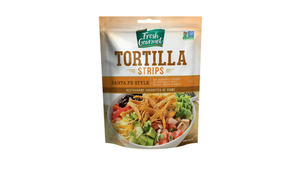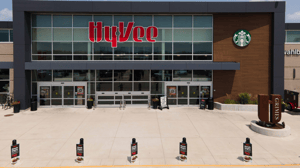MERGER MAY CUT PRICES IN PAPER GOODS CATEGORY
DALLAS -- The proposed merger between Kimberly-Clark here and Scott Paper should bode well for retailers through lower prices, more product innovation and improved category management, according to those who track the consumer paper goods industry.But the merger may also lessen competition by sparking a new wave of mergers among paper producers, some industry observers caution.The union of Kimberly-Clark
July 31, 1995
RICHARD TURCSIK
DALLAS -- The proposed merger between Kimberly-Clark here and Scott Paper should bode well for retailers through lower prices, more product innovation and improved category management, according to those who track the consumer paper goods industry.
But the merger may also lessen competition by sparking a new wave of mergers among paper producers, some industry observers caution.
The union of Kimberly-Clark and Scott would create an $11 billion powerhouse that would be the world's leading tissue manufacturer, and the second-largest household and personal care products company in the U.S., behind Cincinnati-based Procter & Gamble. Kimberly-Clark counts Kleenex, Huggies, Hi-Dri and Kotex among its stable of products.
Scott, with revenues of $3.6 billion, recently moved its headquarters from Philadelphia to Boca Raton, Fla., and counts Scott and Cottonelle bathroom tissue, Scott and Viva paper towels and napkins, Wash-a-bye Baby and Baby Fresh baby wipes and Scotties facial tissue among its products.
"There are going to be some very beneficial things that are going to come out [of the merger] from the retail perspective," said Don Stuart, a partner in Cannondale Associates, a consulting group which maintains dual headquarters in Wilton, Conn., and Evanston, Ill.
"I think we're going to see a revived initiative by the new Kimberly-Clark/Scott to tackle its categories in a very competitive way that is meant to build these categories for long-term growth. It is going to be good for the consumer and the retailer. The only potential negative is that it may be a little tough on P&G because they are going to be going head to head," he said.
"I think supermarkets can really benefit from this because
everything Kimberly-Clark and Scott are going to do now is going to be to help build those categories. I see a lot more new products, category management initiatives, programs to build the total category and total aisle because of their dominance," Stuart said.
"The combined companies are certainly going to make for a more power, strength and marketing power," said Linda Lieberman, a securities analyst at Bear Stearns, New York. "When you are putting Huggies, Kleenex and Scott on the shelves, clearly you are more important than just putting Huggies and Kleenex. They are now more important and they should be able to get better deals. The synergies are there.
"The fit is so good that I can't see products that are going to be eliminated, other than maybe the Scotties brand in facial tissues and Kleenex toilet tissue. The stores are not going to eliminate Viva, Scott or P&G's Bounty brands from their shelves," she said.
Chris Hoyt, president, Hoyt & Co., a consulting firm that is a division of J. Brown/LMC Group, Stamford, Conn., said the merger will give Kimberly-Clark a revised clout with the trade.
"Kimberly-Clark will be able to bring some real technology and some real category management to the floor. This is because Scott was a leading proponent of that and very highly regarded in the trade as a category management supplier. They are good technologically, good with information and good with buyers. I think a lot of that cross-pollination will result in a good benefit for both retailers and the manufacturers," he said.
Paul J. Kelly, principal, Silvermine Consulting Group, Westport, Conn., said that at least in the short run the merger should lower consumer paper prices.
"The new Kimberly-Clark will have enormous efficiencies in terms of logistics, shipping and those types of things once they get combined. The merger will give a counterbalance to Procter & Gamble, although Kimberly was doing a pretty good job even prior to this. It will also make P&G think twice before raising prices," he said.
A food broker told SN Kimberly-Clark will have to allay consumer concerns following the repositioning of Scott's brands, something he said resulted in products of a reduced size and increased cost. Its ScotTowels were even profiled on a recent 20/20 broadcast about shrinking products.
"The Scott marketing department has just gone and destroyed the brand. Now the easy thing to do is to turn around and sell it to another company," he said, adding that Scott is now introducing a 25% larger bonus size ScotTowels as a form of damage control.
Food brokers also expressed concern because Kimberly-Clark uses a direct sales force, while Scott is primarily broker driven.
"For the food broker industry I have guarded optimism because Scott Paper does use brokers and we hope that Kimberly-Clark would look at the benefits and value that a local broker can bring to the retail side," said one broker.
But Kathryn McAuley, a paper and forest securities analyst with Brown Brothers Harriman, New York, said Kimberly-Clark will probably elect to stick with its sales force.
"On balance, Kimberly has been more successful than Scott. So I would assume that the Kimberly methodology would win. Their sales force is in place and that would be one area where there would be quick and easy cost savings. The Kimberly sales force is already known. They already know their customers and I think it would be very efficient," she said.
McAuley said she wouldn't be surprised if the Kimberly-Clark/ Scott union spurs more mergers.
"We seem to be in merger mania, as evidenced by the way the banks are going. It is a deal that makes incredible sense and I wouldn't be surprised if we didn't see more of them," she said.
Hoyt said he also expects further consolidation in the near future.
But Connie Maneaty, a consumer products securities analyst with Bear Stearns, said she doubts the merger will spark further consolidation in the paper industry.
"All of the competitors are very well established. Their market shares are very well established and their trade relationships are all there," she said.
About the Author
You May Also Like




